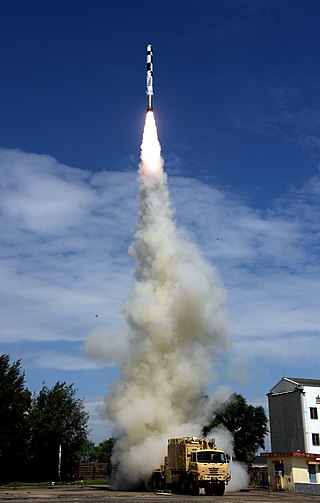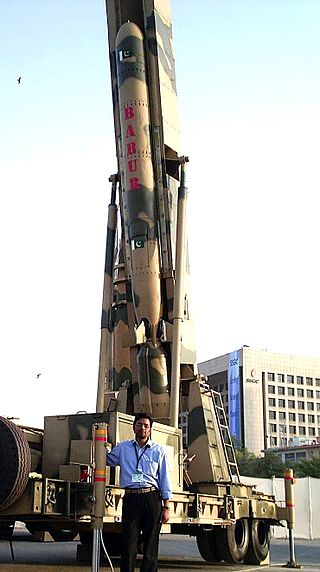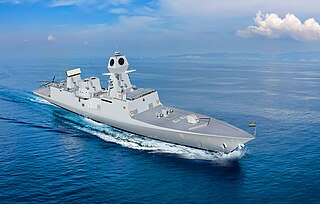Related Research Articles

A cruise missile is an unmanned self-propelled guided vehicle that sustains flight through aerodynamic lift for most of its flight path and whose primary mission is to place an ordnance or special payload on a target. Cruise missiles are designed to deliver a large warhead over long distances with high precision. Modern cruise missiles are capable of traveling at high subsonic, supersonic, or hypersonic speeds, are self-navigating, and are able to fly on a non-ballistic, extremely low-altitude trajectory.

The TomahawkLand Attack Missile (TLAM) is a long-range, all-weather, jet-powered, subsonic cruise missile that is primarily used by the United States Navy and Royal Navy in ship and submarine-based land-attack operations.

The BrahMos is a medium-range ramjet supersonic cruise missile that can be launched from submarines, ships, fighter aircraft or TEL. It is a joint venture between the Indian Defence Research and Development Organisation (DRDO) and the Russian Federation's NPO Mashinostroyeniya, who together have formed BrahMos Aerospace. The missile is based on P-800 Oniks. The name BrahMos is a portmanteau formed from the names of two rivers, the Brahmaputra of India and the Moskva of Russia.

The Babur, is an all-weather, subsonic cruise missile developed and designed by the National Defence Complex (NDC) of Pakistan.

The AGM-158 JASSM is a low detection standoff air-launched cruise missile developed by Lockheed Martin for the United States Armed Forces. It is a large, stealthy long-range weapon with a 1,000-pound (450 kg) armor piercing warhead. It completed testing and entered service with the U.S. Air Force in 2009, and has entered foreign service in Australia, Finland, and Poland as of 2014. An extended range version of the missile, the AGM-158B JASSM-ER, entered service in 2014 as well as an anti-ship derivative, the AGM-158C LRASM, in 2018. By September 2016, Lockheed Martin had delivered 2,000 total JASSMs comprising both variants to the USAF.
The Defence Industry of Pakistan, established in September 1951, mainly falls under the purview of the Ministry of Defence Production (MoDP). It aims to foster collaboration and oversee the diverse range of military production facilities that have emerged since Pakistan's independence. The MoDP comprises specialized organizations, each dedicated to various aspects of the defence industry, including research and development, production, and administration.
The Indian Ballistic Missile Defence Programme is an initiative to develop and deploy a multi-layered ballistic missile defence system to protect India from ballistic missile attacks. It was launched in 2000 after Kargil War by the Atal Bihari Vajpayee government. Testing was carried out and continuing as of 2006, and the system was expected to be operational four years from then according to the head of the country's missiles development programme, Vijay Kumar Saraswat.

The IV Corps is field a corps of the Pakistan Army, headquartered in Lahore, Punjab, Pakistan. Having established in January 1966, it is Pakistan army's of one of ten maneuver formation which saw its deployment against the Indian Army in 1971.

The Joint Strike Missile (JSM) is a multi-role, air-launched cruise missile under development by the Norwegian company Kongsberg Defence & Aerospace and American company Raytheon Missiles & Defense. The JSM is derived from the Naval Strike Missile.
Conventional Prompt Strike (CPS), formerly called Prompt Global Strike (PGS), is a United States military effort to develop a system that can deliver a precision-guided conventional weapon strike anywhere in the world within one hour, in a similar manner to a nuclear ICBM. Such a weapon would allow the United States to respond far more swiftly to rapidly emerging threats than is possible with conventional forces. A CPS system could also be useful during a nuclear conflict, potentially replacing the use of nuclear weapons against up to 30% of targets. The CPS program encompasses numerous established and emerging technologies, including conventional surface-launched missiles and air- and submarine-launched hypersonic missiles, although no specific CPS system has yet been finalized as of 2018.

The Nilgiri-class frigates, formally classified as the Project-17 Alpha frigates (P-17A), are a series of stealth guided-missile frigates currently being built by Mazagon Dock Shipbuilders (MDL) and Garden Reach Shipbuilders & Engineers (GRSE), for the Indian Navy. The seventh and final ship of the Project 17A frigates, named Mahendragiri, was launched on 1 September 2023 at the Mazagon Dock by Dr Sudesh Dhankhar, wife of Indian vice-president Jagdeep Dhankhar. It is expected to be commissioned in 2024.
The Indian Air Force has been undergoing a modernization program to replace and upgrade outdated equipment since the late 1990s to meet modern standards. For that reason, it has started procuring and developing aircraft, weapons, associated technologies, and infrastructures. Some of these programs date back to the late 1980s. The primary focus of current modernization and upgrades is to replace aircraft purchased from the Soviet Union that currently form the backbone of the Air Force.

The Hatf Program was the classified program by the Ministry of Defence (MoD) of Pakistan for the comprehensive research and the development of guided missiles. Initiatives began in 1986–87 that also received support from Prime Minister Benazir Bhutto in a direct response to India's equivalent program in 1989.

The Pakistan Army Corps of Air Defence is a military administrative and combat service support branch of the Pakistan Army. Reporting direct from the Army GHQ, it is commanded by Major-General Sarfraz Ahmed who served its director-general as of 2023.

Missile defense systems are a type of missile defense intended to shield a country against incoming missiles, such as intercontinental ballistic missiles (ICBMs) or other ballistic missiles. The United States, Russia, India, France, Israel, Italy, United Kingdom, China and Iran have all developed missile defense systems.
The RS-28 Sarmat, often colloquially referred to as Satan II by media outlets, is a Russian liquid-fueled, HGV-equipped and FOBS-capable super-heavy intercontinental ballistic missile (ICBM) produced by the Makeyev Rocket Design Bureau. It is intended to replace the Soviet R-36M ICBM in Russia's arsenal.

The defense industry of Ukraine is a strategically important sector and a large employer in Ukraine. After working for several decades mostly for the arms export markets, in 2014 it has moved significantly into increased Ukrainian military procurement since the start of the war in Donbas.
Lieutenant General (Retired) Hamood Uz Zaman Khan is a military officer of Pakistan, who has served in various capacities in the Pakistan Army. He is known for establishing the National Command & Operation Centre (NCOC) during the COVID-19 pandemic. Post-retirement, he was appointed as the Secretary of Defence and has also served as the federal secretary of the Ministry of Defence Production. He has been recognized with the award of Hilal-i-Imtiaz (Military). He is an alumnus of Command and Staff College Quetta, National Defense University, Islamabad, and National Defense University, USA.
The Pakistan Armed Services Board (PASB) is a welfare organization department under the Ministry of Defence in Pakistan. It was established to assist soldiers, sailors and airmen serving in various capacities in the armed forces.
References
- 1 2 Nazar, Nuzhat (February 22, 2020). "Ministry of defence production: Government decides to turn 5 entities into autonomous bodies". Brecorder.
- 1 2 Nazar, Nuzhat (October 20, 2022). "Defence procurement, FWO, DLA: AGP highlights massive malfeasance". Brecorder.
- 1 2 Panda, Ankit. "Pakistan Tests An Indigenously Developed Anti-Ship Cruise Missile". thediplomat.com.
- ↑ Gady, Franz-Stefan. "Pakistan's Navy Test Fires Indigenous Anti-Ship/Land-Attack Cruise Missile". thediplomat.com.
- ↑ "IDEAS 2012: Pakistan eyes comeback in global arms market". The Express Tribune. November 6, 2012.